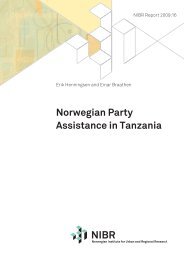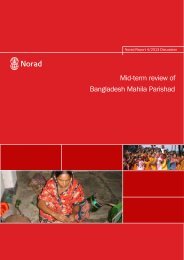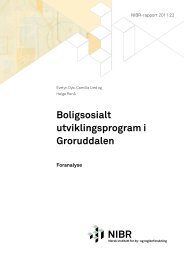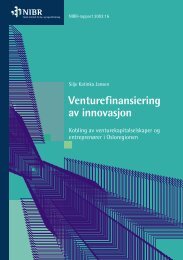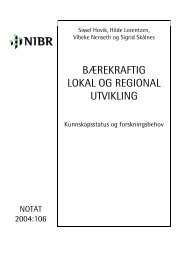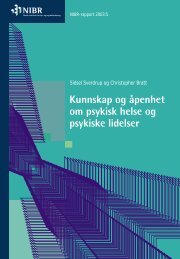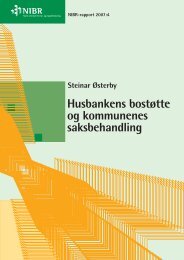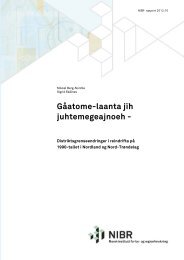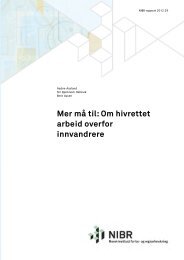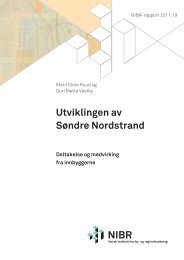Evaluation of the Southern and Eastern Africa Regional Centre for ...
Evaluation of the Southern and Eastern Africa Regional Centre for ...
Evaluation of the Southern and Eastern Africa Regional Centre for ...
- No tags were found...
You also want an ePaper? Increase the reach of your titles
YUMPU automatically turns print PDFs into web optimized ePapers that Google loves.
36group to do lectures, training, <strong>and</strong> to organise meetings, <strong>for</strong> instance. One graduatehad been sent to <strong>the</strong> central province in a leadership position after <strong>the</strong>y saw hiscapability following <strong>the</strong> Masters. The graduates do training in <strong>the</strong> Police College <strong>and</strong><strong>the</strong>y <strong>of</strong>fer courses. The respondent stated that it is amazing what <strong>the</strong>y have been ableto do. He said that <strong>the</strong>y would even prefer 20 Zambians to take <strong>the</strong> Masters. Hebelieves that <strong>the</strong> course has contributed positively, even to <strong>the</strong> society <strong>and</strong>community policing. When asked about whe<strong>the</strong>r <strong>the</strong> work on gender based violencewould have been developed without <strong>the</strong> graduates, one <strong>of</strong> <strong>the</strong> employers in <strong>the</strong>police stated that it would not have happened without <strong>the</strong>m as <strong>the</strong>y would not have<strong>the</strong> skills. Be<strong>for</strong>e that most women, he observed, thought that it was <strong>the</strong> right <strong>of</strong> <strong>the</strong>man to beat <strong>the</strong>m.3.5.2 Limits to ImpactThe selection <strong>of</strong> findings reflects an impressive range <strong>of</strong> arenas <strong>and</strong> influence. Thereremains, none<strong>the</strong>less, <strong>the</strong> assumption that graduates are able to impact institutionalstructures beyond <strong>the</strong>ir individual actions <strong>and</strong> skills acquisition. Although out <strong>of</strong> <strong>the</strong>control <strong>of</strong> <strong>the</strong> <strong>Centre</strong> following graduation it is important to test <strong>the</strong>se assumptionsthat graduates unleash influence in terms <strong>of</strong> <strong>the</strong> broader developmental impact <strong>of</strong> <strong>the</strong>programme. Beyond <strong>the</strong>ir own actions, many respondents stated it was simplydifficult to identify broader institutional impact. Some went fur<strong>the</strong>r in activelydownplaying this type <strong>of</strong> impact. A significant correlation was made between <strong>the</strong>position held by <strong>the</strong> graduate <strong>and</strong> whe<strong>the</strong>r influence was achievable. In Zambia, <strong>for</strong>example, some <strong>of</strong> <strong>the</strong> graduates are in administrative positions, <strong>and</strong> may notinfluence as much as o<strong>the</strong>rs in decision making or more political positions. Onerespondent, herself a graduate, suggested in Zambia that ‘<strong>the</strong> graduates impact is toosmall, it is scattered. I am not really seeing it.’An interesting case in point concerns magistrates or judges identified above asmaking more gender sensitive judgements, as documented. This inevitably impactson <strong>the</strong> cases that come be<strong>for</strong>e <strong>the</strong>m. But whe<strong>the</strong>r a shift in institutional culturescomes about is highly questionable. One judge, <strong>for</strong> example, upon being pushedprecisely on this issue by <strong>the</strong> evaluators, immediately claimed it was far too ambitiousto expect an individual to exert wider influence in institutions. An individual isconstrained (<strong>and</strong>, conversely, enabled, at times) by personal issues in <strong>the</strong> workplace.Graduates also encounter hierarchies <strong>and</strong> <strong>the</strong> general nesting <strong>of</strong> power relationswithin institutional structures. In her own case, <strong>the</strong> judge in question had had to dealwith opposition from her superior to do <strong>the</strong> course.Ano<strong>the</strong>r graduate commenting on <strong>the</strong> situation <strong>of</strong> <strong>the</strong> judge in question showed thatsome employers opposed taking <strong>the</strong> course. In contrast, ‘as long as you are <strong>the</strong> topperson, you can make institutional impact’, suggested one Zambian policeman. Inclose relation, one comment on <strong>the</strong> current deputy minister <strong>for</strong> Women’s Affairs,suggested as follows: ‘She (current deputy minister <strong>for</strong> Women’s) is even morepowerful than <strong>the</strong> minister herself, <strong>the</strong>y were very active, <strong>the</strong> ministry <strong>of</strong> womenaffairs: it has never happened be<strong>for</strong>e that during <strong>the</strong> week <strong>of</strong> awareness on genderbased violence that <strong>the</strong> ministry would run a peaceful march in <strong>the</strong> streets on <strong>the</strong>issues <strong>of</strong> domestic violence <strong>and</strong> it came in <strong>the</strong> newspapers. It had never happenedbe<strong>for</strong>e. It would not have happened if not <strong>for</strong> <strong>the</strong> course <strong>and</strong> focus provided’.Ano<strong>the</strong>r graduate pointed out how change ‘starts from individual contributions to




